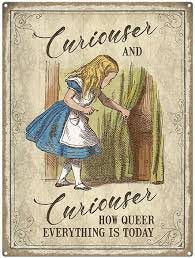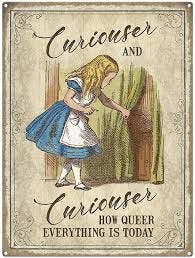Another clickbaity title: sorry, but I’m not sorry. Besides, I think it’s true.
This piece is about leading with curiosity, being an experimental artist or scientist and learning to meander.
It’s a practice. And it isn’t easy in a world obsessed with SMART Goals (if you don’t know the acronym, you are lucky; do not Google it). It also doesn’t help that we’re wired to create linear narratives out of the mess we call life. And I know that you have all heard about how you should lean into ‘the process’ and not ‘the outcome’ and that ‘the path is the destination,’ etc. etc.
But let’s sidestep this because I don’t think it’s one or the other. I do believe you need goals (regardless of their appropriateness) because we all need a sense of directionality, but we also ferociously need to learn how to meander, redirect and iterate. So how do you achieve a balance? Do you set a goal to meander? Read on.
Curiosity is a topic Elizabeth Gilbert eloquently discussed on the OnBeing podcast (thanks, Eric). She talks about choosing the path of curiosity over the path of fear: “Curiosity is our friend that teaches us to become ourselves. And it’s a very gentle friend and a very forgiving and constant friend. Passion is not so constant, not so gentle, and sometimes not so available.”
“Curiosity gives you clues,” she says. When I heard that, my stomach relaxed. Following curiosity means there are no ‘musts’ or ‘shoulds’. You win simply by following clues. Often, we harm ourselves by feeling like failures when no tangible outcome has emerged (yet), missing the point that it’s all about the clues. It’s a waste of emotional energy to feel this lousy when you can simply sidestep this unwarranted sense of ‘failure’.
When you allow yourself to follow your curiosity, you can stop midway and say, “Oh, actually, that’s not quite what I wanted, so let’s go this way instead.” You can reach dead ends and feel fine because you judge yourself on a new metric—if I may use this productivist language— you followed your curiosity. Some people go further and talk about intuition, but I haven’t thought about it enough to share anything of value on that.
Curiosity allows you to experiment. There is a delightful childlike quality to it, and as we all know, children have figured out life—they just forget how when they grow up.
I wonder how it would feel if we started most things with ‘I wonder…’: ‘I wonder how this meeting is going to go…,’ ‘I’m curious to see what this interview is going to feel like,’ ‘I wonder how this person is going to show up…’
Curiosity is gentle; it nudges you, it holds you, it doesn’t judge you.
Elizabeth Gilbert goes further: “And we live in a world that has come to fetishize passion above all. There is a great deal of pressure.” Remember that Steve Jobs speech about passion? Cal Newport already flagged it as BS*, but I’ll double down on it: Steve Jobs is the king of meandering. He started with a calligraphy class before stumbling upon the computer shenanigans, which over the years turned into Apple. Anyhow, I don’t want to rant here, but I get offended at how often business wisdom has no wisdom.
Elizabeth again: “If you don’t happen to have a clear passion, if you have lost your passion, or if you are in a change of life where your passion is shifting, or if you’re not certain and someone says ‘it’s easy, just follow your passion,’ I do think that person has harmed you.” Amen, Lizzie.
For me, it’s not really about curiosity versus passion (I let go of that notion ages ago); it’s about ‘curiosity’ versus ‘achievement.’ There is nothing wrong with wanting to achieve. Except if you’re in the exploration phase—which, let’s be honest, covers much more of life than we care to admit. What do I mean by that? When you set yourself a goal to ‘land a job,’ ‘create a business,’ or ‘find love,’ there is an incompressible amount of exploring that needs to happen, and that exploration can only yield quality results if you follow your dear friend ‘curiosity’. If you ‘cancel’ the exploration part to achieve faster, you create unnecessary anxiety and might miss important data. And who wants to end up with the wrong job, business, or partner?
Oh, but Lina, who has time for curiosity when you need something asap? There is a Moroccan expression that goes: ‘The one who hurries ends up being late.’ Making inappropriate decisions in your career, business, or personal life for the sake of ‘reaching a goal’ will lose you much more time in the long run. There is no shortcut…That being said, if your bank account is screaming, by all means, get that gig, but don’t forget to stay curious.
Again, it’s a practice. As you know, I’m a recovering ‘productivista,’ so I still have moments where old bits of myself are protracted forward and judge this as self-indulging. But more often than not, I just feel at peace because I know how hard it is to truly know what we really want (that’s another topic; and here is a great article about this) so leading with curiosity remains my best option.
Until next time,
Lina
*Last year I wrote a piece called ‘Sometimes you progress, sometimes you regress’, I think adding curiosity to the mix is even more helpful.
*Cal Newport wrote a book called "So Good They Can't Ignore You," which has a great title that made me chuckle a bit, but I loved how it deconstructs the whole idea of passion driving work. It’s also a very decent book.
*Elizabeth Gilbert wrote ‘Eat, Pray Love’, full disclosure I did not read the book but I love hearing her speak about her creative process.





Look up Tom Morgan. Curiosity Sherpa.
Hi Lina! Nice and relatable post. I hate to tell you that curiosity has also been co-opted as a 'business wisdom' too :) eg Ray Dalio has identified it as a key trait for 'success'. But you and all the curiosity advocates are right; without curiosity you're unlikely to excel at anything. That said it is important to put some guardrails around it in order to actually achieve anything. I say this as someone who can spend a looooooong time indulging my curiosity but maybe not moving closer to any particular goal. But at least it's enjoyable!